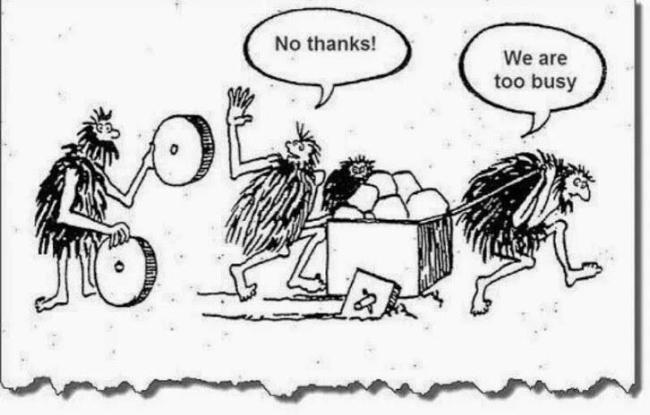What Happens When You Don’t Spend the Time Now?
 Why do you pay $40 or so for an oil change? Because it will cost you a lot more than $40 if you don’t change your oil and your engine goes. And it will take you a lot more time to fix your car at that point, rather than waiting the 15 minutes for an oil change. So, my question today is why don’t IT professionals always take this approach?
Why do you pay $40 or so for an oil change? Because it will cost you a lot more than $40 if you don’t change your oil and your engine goes. And it will take you a lot more time to fix your car at that point, rather than waiting the 15 minutes for an oil change. So, my question today is why don’t IT professionals always take this approach?
If you refer to the cartoon at the top of the article, lack of time now prevents professionals from improving their processes. They are stuck in their way of doing things, the way they know how, because they don’t want to spend the time to listen, evaluate, and discuss potential alternatives. It is easy to continue to do what you have been doing, even if it isn’t the most effective and efficient way. It takes time to switch – to evaluate where your gaps are, get people involved internally, and listen to salespeople pitch various products (ugh!). Furthermore, it takes time to find the money to support the project and time to implement new processes across your organization. Believe me, I know!
But, if you can think about the time you can save every day by running your processes more efficiently, you can justify spending that extra time now. Especially if a solution is right in front of you, like some nice new round tires for your wagon. And, if you start spending the time now to reevaluate your current processes and implement more efficient ones, it will be a short amount of time relative to the time spent recovering from a significant event like a data breach. (That would be like your engine failing and you’re on the side of the road waiting for AAA.)
Themost recent breach I have heard of involved Concentra Health Services. They had one unencrypted laptop stolen and are suffering from a $1.7 million fine by the Department of Health and Human Services for violating HIPAA regulations. The amount of money that Concentra would have spent encrypting all sensitive data, or even all data entirely, is significantly less than the amount of the fine.
Another example of a costly event, the federal court in Florida just sided with the consumers in a breach in 2009 due to unencrypted data involving AvMed, a health insurer, leading this company to pay $3 million in a settlement. 5 years later, this company is still feeling the monetary implications of the data breach.
Add on the negative feelings by consumers towards a company who has experienced a breach and the loss of potential customers. And companies still don’t want to pay the money now to improve their processes! Even if it is less money than a significant event. Whether it is lost or stolen laptops, a cyber attack, unencrypted devices or another reason, data breaches are not slowing down; and, companies are finding themselves paying the big bucks for exposing personal information and not having processes in place to prevent the breach.
Maybe it is hard to imagine that your current processes could result in a significant event like a data breach, impacting thousands and costing the company millions. But continuing with your current processes when there is a more efficient way is costing you time on a regular basis as well, perhaps even daily. Think back to the cartoon, the man is continuing on with his more time consuming, more difficult way of doing things instead of taking a step back and seeing if there is a better way.
Let’s use an example. Say you are using spreadsheets to track your IT assets. It takes a lot of time to manually enter information into a spreadsheet. It takes a lot of time to maintain the spreadsheet or spreadsheets. And if someone, maybe a manager or an auditor, asks you where an asset is located, it takes a lot of time to locate and recall an asset. If you are using spreadsheets, you are pushing the barrel with square tires! Now imagine, if you had a system to manage all your assets, you can easily search and determine the location, and print out a nice report for audit within minutes.
Trust me, I know listening to a salesperson sometimes stinks! But they can be the keeper of the tool that helps you improve your operations and mitigate risk, ultimately helping you save money and time in the future, near and distant. My advice: Find a salesperson that understands what you want and need, and has a product that doesn’t add any extra work to your daily operations. Don’t be resistant to spending a little time and money now instead of waiting and spending a lot of time and a lot more money in the future. Good luck!
